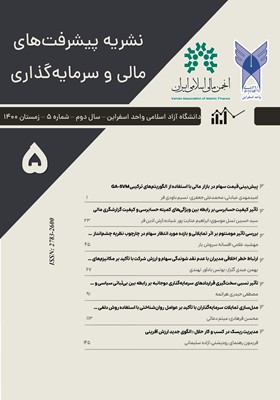ارتباط خطر اخلاقی مدیران با عدم نقد شوندگی سهام و ارزش شرکت با تاکید بر مکانیزمهای حاکمیت شرکتی
محورهای موضوعی : سرمایهگذاری
بهمن عبدی گلزار
1
![]() ,
یونس بادآور نهندی
2
*
,
یونس بادآور نهندی
2
*
![]()
1 - گروه حسابداری، واحد اسکو، دانشگاه آزاد اسلامی، اسکو، ایران.
2 - گروه حسابداری، واحد تبریز، دانشگاه آزاد اسلامی، تبریز، ایران
کلید واژه: حاکمیت شرکتی, ارزش شرکت, خطر اخلاقی مدیران, عدم نقد شوندگی سهام,
چکیده مقاله :
خطر اخلاقی در نتیجه عواملی مانند اختیارهای تفویضی به مدیران و انگیزه آنان برای استفاده از این اختیارها در جهت منافع شخصی ایجاد میگردد و ممکن است پیامدهایی مانند عدم نقدشوندگی سهام و کاهش ارزش شرکت را در پی داشته باشد. هدف اصلی پژوهش حاضر بررسی ارتباط خطر اخلاقی مدیران با عدم نقدشوندگی سهام و ارزش شرکت با تأکید بر مکانیزمهای حاکمیت شرکتی میباشد. دادههای پژوهش از طریق صورتهای مالی 180 شرکت پذیرفته شده در بورس اوراق بهادار تهران در دوره زمانی 14 ساله از 1386 تا 1399 گردآوری شده است. برای آزمون فرضیههای پژوهش از دادههای پانلی و مدل رگرسیون چندگانه استفاده شد. نتایج حاصل از پژوهش نشان داد که خطر اخلاقی مدیران بر عدم نقدشوندگی سهام دارای تأثیر مثبت و معنیدار میباشد. همچنین خطر اخلاقی مدیران بر ارزش شرکت تأثیر منفی و معنیدار دارد. شاخص تعاملی خطر اخلاقی مدیران و حاکمیت شرکتی بر عدم نقدشوندگی سهام تأثیر منفی و معنیدار دارد و بر ارزش شرکت دارای تأثیر مثبت و معنیدار میباشد؛ بنابراین خطر اخلاقی مدیران پیامدهای نامطلوبی مانند کاهش ارزش شرکت و عدم نقدشوندگی سهام را به دنبال دارد و مکانیزمهای حاکمیت شرکتی باعث تضعیف پیامدهای مخرب خطر اخلاقی مدیران میگردد. با آگاهی از پیامدهای نامطلوب خطر اخلاقی مدیران و همچنین تأثیر مکانیزمهای حاکمیت شرکتی بر تضعیف شدت اثر خطر اخلاقی مدیران، میتوان تصمیمهای بهینهای را در جهت کنترل خطر اخلاقی اتخاذ نمود و از طریق تقویت مکانیزمهای حاکمیت شرکتی، منافع ذینفعان بهویژه سهامداران را تأمین نمود.
Moral hazard is created as a result of factors such as delegated powers to managers and their motivation to use these powers for self interest and can have consequences such stock illiquidity and devaluation of the company. The main purpose of this study is to investigate the relationship between moral hazard with stock illiquidity and firm value with emphasis on corporate governance mechanisms. The research data were collected through the financial statements of 180 companies listed on the Tehran Stock Exchange over a period of 14 years from 2007 to 2021. Panel data and multiple regression model were used to test the research hypotheses. The results of the study showed that the moral hazard of managers has a positive and significant effect on the illiquidity of stocks Also, the moral hazard of managers has a negative and significant effect on the firm value.The interactive index of moral hazard and corporate governance has a negative and significant effect on stock illiquidity and has a positive and significant effect on firm value. Therefore, moral hazard of managers has undesirable consequences such as devaluation of the company and stock illiquidity, and corporate governance mechanisms weaken the destructive consequences of moral hazard of managers. By being aware of the adverse consequences of moral hazard of managers and also the effect of corporate governance mechanisms on weakening the severity of moral hazard, it is possible to make optimal decisions to control moral hazard by strengthening corporate governance mechanisms and serving the interests of stakeholders, especially shareholders.
Hart, O.D. and Holmström, B. (1986). The theory of contracts. Department of Econo mics.
Holmstrom, B. (1979). Moral Hazard and Observability. The Bell Journal of Economics, 10(1), 74-91.
Marris, R. (1998). Managerial Capitalism in Retrospect. London Palgrave Macmillan Uk.
_||_

